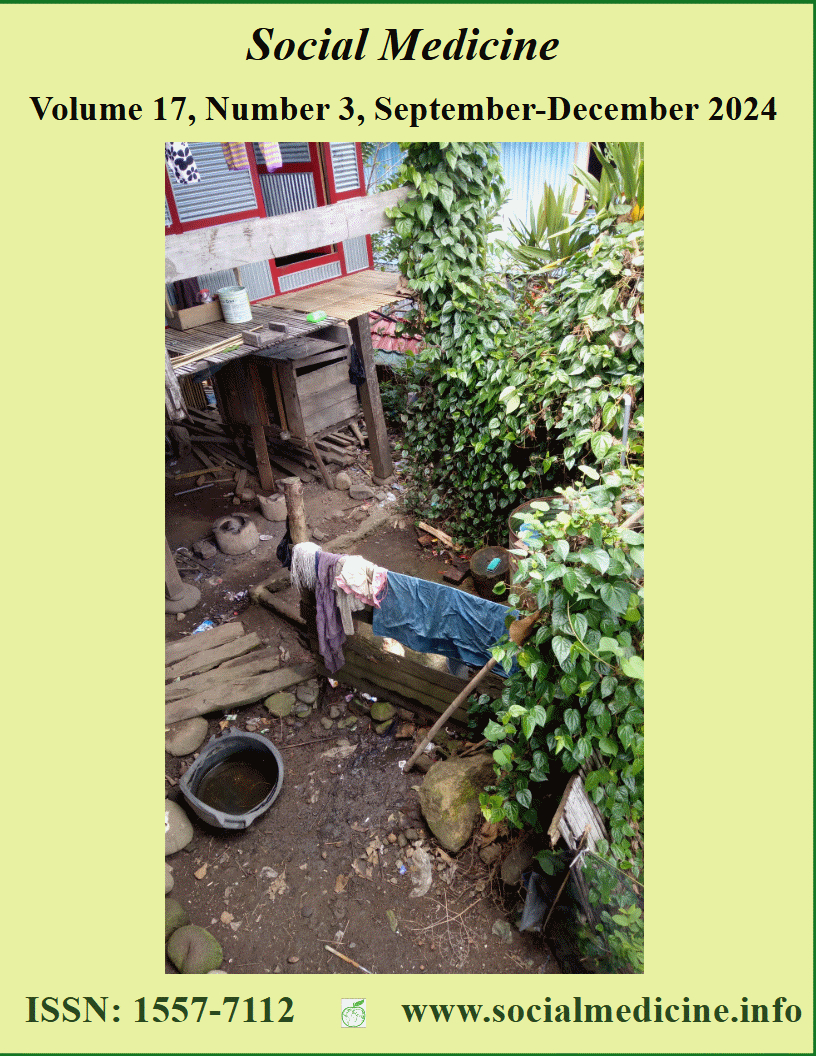Factors Influencing the Well-being of Nurses in Selected Oncology Departments of Tertiary Hospitals in Kerala, India: A Qualitative Study
Keywords:
Kerala, Oncology Nurse, Qualitative, Stress, Well-BeingAbstract
Introduction. The well-being of nurses in the field of oncology is paramount, both for the individuals themselves, also for the healthcare system. The purpose of this study was to comprehend and investigate nurses' experiences in the field of oncology, to understand the factors influencing their well-being. Methods. Between January 1, 2023, and April 5, 2023, a descriptive qualitative design was employed to gather data from individual in-depth interviews with eleven nurses working in the oncology department of a tertiary care hospital in Central Kerala, South India. Participants were selected and recruited based on inclusion criteria and purposive sampling techniques. A semi-structured in-depth face-to-face interview was conducted to obtain the data. Codes were identified, patterns analyzed, and themes were recorded using the Colaizzi approach, 7 steps of thematic analysis. Results. The mean experience of the participants in the oncology department was 6.2 years and all were females. Two main themes that emerged from the analysis were Roadblocks to well-being and Concerns with satisfaction. Additionally, four sub-themes under the first theme and six under the second were identified, providing a nuanced understanding of the challenges faced by these nurses. Conclusion.The study's nurses battled occupational stress as well as physical and psychological issues, which can even reduce their quality of life. The results of this investigation provide valuable primary data for developing bio-psycho-social skill interventions for health professionals’ well-being in the oncology department.
References
Cummings GG, Lee SD, Tate KC. The evolution of oncology nursing: Leading the path to change. Can Oncol Nurs J. 2018;28(4):314-317. http://www.ncbi.nlm.nih.gov/pubmed/31148787
World Health Organization. https://www.who.int/en/news-room/fact-sheets/detail/cancer. 2021.
Mathur P, Sathishkumar K, Chaturvedi M, et al. Cancer Statistics, 2020: Report From National Cancer Registry Programme, India. JCO Glob Oncol. 2020;6(6):1063-1075. doi:10.1200/GO.20.00122
George PN, Ganesh MP, Chawak S, Chittem M. Factors Associated with Choosing the Kerala Model of Palliative Care versus Standard Care among Indian Cancer Patients. Indian J Med Paediatr Oncol. Published online March 14, 2022. doi:10.1055/s-0042-1742613
Babaei S, Taleghani F. Compassionate Care Challenges and Barriers in Clinical Nurses: A Qualitative Study. Iran J Nurs Midwifery Res. 2019;24(3):213-219. doi:10.4103/ijnmr.IJNMR_100_18
Wakefield MK, Williams DR, Menestrel S Le, Flaubert JL, eds. The Future of Nursing 2020-2030. National Academies Press; 2021. doi:10.17226/25982
Moghadam MP, Nasiri A, Mahmoudirad G. Exploring the Emotional Concerns of Oncology Nurses: A Qualitative Study. Iran J Nurs Midwifery Res. 2022;27(5):425-431. doi:10.4103/ijnmr.ijnmr_258_21
Jang H-Y, Yang J-E, Shin Y-S. A Phenomenological Study of Nurses’ Experience in Caring for COVID-19 Patients. Int J Environ Res Public Health. 2022;19(5). doi:10.3390/ijerph19052924
Application of Colaizzi’s Method of Data Analysis in Phenomenological Research. Med Leg Updat. Published online March 19, 2021. doi:10.37506/mlu.v21i2.2800
Johnston B, Dowling M. Qualitative Research and Cancer Nursing: A Guide for Novice Researchers. Semin Oncol Nurs. 2023;39(2):151397. doi:10.1016/j.soncn.2023.151397
Morse JM. Determining Sample Size. Qual Health Res. 2000;10(1):3-5. doi:10.1177/104973200129118183
Thomas SP, Sohn BK. From Uncomfortable Squirm to Self-Discovery: A Phenomenological Analysis of the Bracketing Experience. Int J Qual Methods. 2023;22. doi:10.1177/16094069231191635
Forero R, Nahidi S, De Costa J, et al. Application of four-dimension criteria to assess rigour of qualitative research in emergency medicine. BMC Health Serv Res. 2018;18(1):120. doi:10.1186/s12913-018-2915-2
Lee M, Choe K, Kim S, Shim Y. How Do Oncology Nurses Cope With the Psychological Burden of Caring for Dying Patients? Cancer Nurs. 2023;46(4):E245-E252. doi:10.1097/NCC.0000000000001102
Ko W, Kiser-Larson N. Stress Levels of Nurses in Oncology Outpatient Units. Clin J Oncol Nurs. 2016;20(2):158-164. doi:10.1188/16.CJON.158-164
Soheili M, Taleghani F, Jokar F, Eghbali‐Babadi M, Sharifi M. Occupational stressors in oncology nurses: A qualitative descriptive study. J Clin Nurs. 2021;30(21-22):3171-3181. doi:10.1111/jocn.15816
Watts R, Botti M, Hunter M. Nurses’ Perspectives on the Care Provided to Cancer Patients. Cancer Nurs. 2010;33(2):E1-E8. doi:10.1097/NCC.0b013e3181b5575a
Challinor JM, Alqudimat MR, Teixeira TOA, Oldenmenger WH. Oncology nursing workforce: challenges, solutions, and future strategies. Lancet Oncol. 2020;21(12):e564-e574. doi:10.1016/S1470-2045(20)30605-7
Challinor J. Global Oncology Nursing Recruitment and Retention: A SWOT Analysis. Semin Oncol Nurs. 2023;39(1):151361. doi:10.1016/j.soncn.2022.151361
Durmus Sarikahya S, Gelin D, Cinar Ozbay S, Kanbay Y. Experiences and Practices of Nurses Providing Palliative and End-of-Life Care to Oncology Patients: A Phenomenological Study. Florence Nightingale J Nurs. 2023;31(Supp1):S22-S30. doi:10.5152/FNJN.2023.23042
Jarrad RA, Hammad S. Oncology nurses’ compassion fatigue, burn out and compassion satisfaction. Ann Gen Psychiatry. 2020;19:22. doi:10.1186/s12991-020-00272-9
Phothikul J, Seven M. Knowledge, Perception, and Skills, and Practices of Oncology Nurses in Cancer Survivorship Care: a Scoping Review. J Cancer Educ. 2023;38(4):1119-1133. doi:10.1007/s13187-023-02311-x
Edwards‐Maddox S. Burnout and impostor phenomenon in nursing and newly licensed registered nurses: A scoping review. J Clin Nurs. 2023;32(5-6):653-665. doi:10.1111/jocn.16475
KIM EY, CHANG SO. Exploring nurse perceptions and experiences of resilience: a meta-synthesis study. BMC Nurs. 2022;21(1):26. doi:10.1186/s12912-021-00803-z
Foster K, Roche M, Delgado C, Cuzzillo C, Giandinoto J, Furness T. Resilience and mental health nursing: An integrative review of international literature. Int J Ment Health Nurs. 2019;28(1):71-85. doi:10.1111/inm.12548
Henshall C, Davey Z, Jackson D. Nursing resilience interventions-A way forward in challenging healthcare territories. J Clin Nurs. 2020;29(19-20):3597-3599. doi:10.1111/jocn.15276
Mohanty A, Kabi A, Mohanty A. Health problems in healthcare workers: A review. J Fam Med Prim Care. 2019;8(8):2568. doi: 10.4103/jfmpc.jfmpc_431_19
Bahinipati J, Sarangi R, Pathak M, Mohapatra S. Effect of night shift on development of metabolic syndrome among health care workers. J Fam Med Prim Care. 2022;11(5):1710. doi: 10.4103/jfmpc.jfmpc_375_21
Weaver SH, de Cordova PB, Vitale TR, Hargwood P, Salmond S. Experiences and perceptions of nurses working night shift: a qualitative systematic review. JBI Evid Synth. 2023;21(1):33-97. doi:10.11124/JBIES-21-00472
Zaider TI, Banerjee SC, Manna R, et al. Responding to challenging interactions with families: A training module for inpatient oncology nurses. Fam Syst Heal. 2016;34(3):204-212. doi:10.1037/fsh0000159
Downloads
Published
How to Cite
Issue
Section
License
Copyright (c) 2024 Social Medicine

This work is licensed under a Creative Commons Attribution-NonCommercial-NoDerivatives 4.0 International License.

